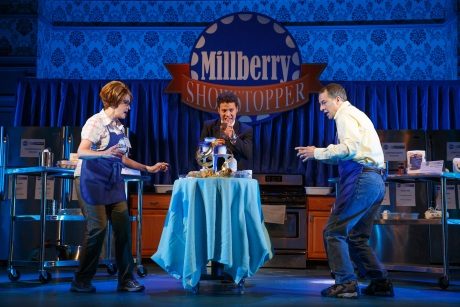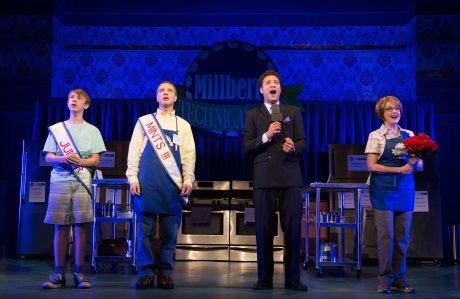Who would have thought that 2016 would be the year we saw not one, but two musicals about… food preparation?

Just six months ago, Bucks County Playhouse premiered A Taste of Things to Come, a musical about a group of 1950s housewives who compete in a cooking contest. And now the Playhouse is at it again, this time with Cake Off, a musical set in the 1990s about a man and a woman competing against each other in a baking contest.
Yet despite their culinary themes, the shows have little in common. Where A Taste of Things was a cheerful, bouncy, nostalgic musical, Cake Off is a quieter, more contemplative, and more complicated show. Its characters seek to rise above their frustrations and limitations; they seethe with long-aborning (but justified) anger. Yet the characters are realistic, engaging, and easy to sympathize with. These people are idealistic strivers, reaching for their dreams – and for a dash of baking soda. Cake Off ends up being an unusual but uplifting musical that gives you a lot to think about, and a lot to connect to.
The opening narration of Cake Off reveals that it was suggested by a real life incident: in 1996, the Pillsbury Bake Off, the nation’s most famous baking contest, increased its grand prize money from $50,000 to $1 million. When that happened, the Bake Off, which had previously been dominated by female contestants, was suddenly inundated with male competitors as well.
Cake Off renames the contest “The Millberry Cake Off.” (Not only do the two company names sound alike, but the fictional company’s blue-and-white seal even resembles the real company’s trademark.)
On the competition’s “baking floor,” we meet two of the fifty contestants. First up is Rita (Michele Ragusa), a 52-year-old divorcee and mother of five who is competing in her third (and, per the contest rules, last) competition. Rita views baking as a combination of “science, love and skill,” as she sings in her opening number. Yet despite her obvious scientific aptitude, she put her dreams on hold and took a job as a receptionist after her husband walked out. When asked why she never became a chemistry teacher, she snaps “Because kids don’t raise themselves.”
Next up is Paul (Euan Morton), a middle aged Patient Care Rep in the middle of a divorce. Paul isn’t an expert baker like Rita; where she’s cool and collected, he’s frantic and unprepared. He has entered the contest, in part, to impress his sullen 14-year-old son Wyatt (Aidan J. Lawrence). But Wyatt finds the contest embarrassing, and would much rather spend time with his mom’s cool new boyfriend than with his wimpy dad. Both Rita and Paul see the Cake Off as a way to prove their worth.
We also meet Jack DeVault (Justin Guarini), the smiling and smarmy emcee who is hosting live coverage of the Cake Off for cable TV. Jack decides to use Paul’s relationship with his son as a “hook” for the TV audience to identify with; he doesn’t notice that Paul and Wyatt aren’t really close at all. And Jack infuriates Rita by ignoring her story, which she feels is more worthy of TV coverage than Paul’s. (“You’d think there’d never been a woman in the kitchen before,” Rita says ruefully.)
Jack hypes the competition between Rita and Paul as a “battle of the sexes.” But Rita and Paul take care not to become enemies. It turns out that Jack and the contest’s organizers have different ideas about reality, and honesty, than Rita and Paul do.
Cake Off takes a while to get going. It’s not a splashy, in-your-face musical; the opening song is a gentle, ruminative ballad about how Rita finds peace in the kitchen. The songs (music by Adam Gwon, lyrics by Gwon and Julia Jordan) tend to be staccato shuffles or ornate ballads with rumbling, arpeggiated chords. (The only musical accompaniment is an offstage piano played by Music Director Andrea Grody.)
Several of the early songs are “list” songs, such as “Round One,” which catalogs ingredients and steps from the competitors’ recipes (“Gently peel the apples… Butter butter butter… Flour flour flour”), with Ragusa and Morton singing in intricate counterpoint. The lyrics contrast the characters’ different approaches effectively, but they come off as rather dry and perfunctory.
And the book by Jordan and Sheri Wilner (based on a short play by Wilner), while full of good jokes, is crammed with exposition early on. It tells us a lot about the characters’ backgrounds, but it doesn’t show us enough about how they behave to make us care about them.
It’s not until Act Two, in “Less Like Me,” a lament sung by Paul about how low he appears in his son’s eyes, that the show’s dramatic stakes start to rise. It’s a ballad that allows the audience to connect to Paul, and it sounds gorgeous in Morton’s plaintive tenor.
Rita counters with a couple of explosive numbers (“Piece of Cake” and “You Can’t Have This”) that put her righteous anger front and center. Both numbers benefit from Ragusa’s endearing performance and her robust, take-no-prisoners belt.
Guarini is a hoot as Jack, the sincerely insincere host. But Cake Off stumbles by having Guarini play two other roles – and having them both be women (one a fellow contestant, the other a past winner). The problem is that Guarini doesn’t perform completely in drag for these parts – he doesn’t wear a wig or a dress. Instead he dons earrings, high-heeled shoes, and some ridiculous accents, and asks us to accept that these people are women (even though it looks like they’re wearing men’s slacks).
As performed by Guarini, these interludes that aren’t campy enough to work. Coming just a few weeks after Charles Busch went all out playing a nun on the Playhouse stage in The Divine Sister, these scenes come off as less outrageous than halfhearted.
And the decision to set the story in 1996 is an unnecessary complication. I only noticed one 1990’s reference in the script (a throwaway joke about Al Gore), and Gwon’s music doesn’t contain any echoes of 1990s pop. There are a few jokes that reveal Jack to be a stuck-in-the-past sexist, but those jokes would work just as well if the show were set in 2016. Updating Cake Off to the present day would not change the show significantly.

Despite the small cast, the limited accompaniment and the minimal amount of dancing (Josh Prince did the choreography), Cake Off feels like a substantial production. In part that’s because of Lauren Helpern’s handsome set, which packs the “baking floor” with every appliance a baker could ever need. But it’s also because there’s a lot going on in this show, with relationships and alliances evolving continuously. Wilner and Jordan’s book gives the characters a lot to do, and the actors rise to the challenge.
Gaye Taylor Upchurch’s careful direction focuses at first on the slow-building tension between the characters, eventually taking time to allow the complexities of the characters to shine through. In discreet moments throughout the show, we see how devoted Rita and Paul are to their kids, and how overly concerned they are with the way they appear to others. The characterizations feel earned and genuine.
With its sophisticated music and its multifaceted characters, Cake Off will win you over. This summer concoction may not be fluffy, but it proves that desserts don’t have to be sugary to leave a good taste in your mouth.
Running Time: Two hours and 20 minutes, including intermission.
Cake Off plays through September 10, 2016 at the Bucks County Playhouse, 70 South Main Street, New Hope, PA. For tickets, call the box office at (215) 862-2121, or purchase them online.




